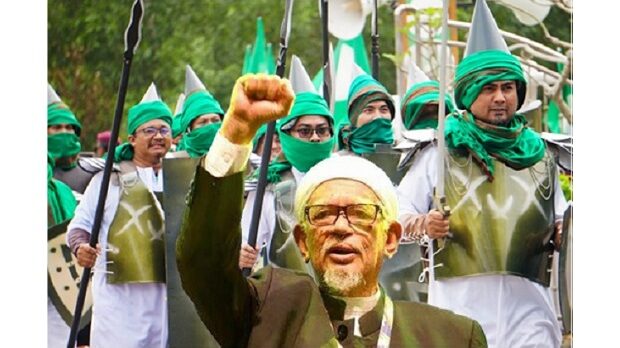HADI & CO’S GRANDIOSE QUEST TO TRANSFORM MALAYSIA INTO THEIR DEFINITION OF AN ‘ISLAMIC STATE’
Pas’ grand quest
IN recent months, several people were found to have breached minor by-laws in the Pas heartland. However, to the rest of the country, these so-called infractions were bafflingly normal, daily occurrences. The contrast couldn’t be more illuminating: seven people were warned for wearing thigh-length shorts at a hawker stall and a salon owner was fined for allowing her female worker to cut a man’s hair.
A department store was once disciplined in Kelantan for putting up “uncovered” mannequins, while men and women are routinely separated in public places. Why are these mundane things, barely registering a thought in other states, criminalised?
The answer is as complex is as it is alarming: they are early steps in Pas’ grandiose quest to transform Malaysia into its definition of an Islamic state, with a dint of democracy.
A setback: Pas’ messianic goals, codified little-by-little in Kelantan, Terengganu and Kedah by-laws, simply can’t lead to the enactment of major syariah laws in the three states because they clash with the Federal Constitution. Thus the strict adherence to their version of syariah beliefs, as stoutly demonstrated by the clothing infractions.
Pas’ Islamic state drive was subdued after they collaborated with PKR and DAP to form Pakatan Rakyat in past decades to challenge Barisan Nasional’s hegemony, but the coalition collapsed after the parties quarrelled over Pas’ theocratic pre-occupation.
Pas “bromance” with the Iranian mullah-styled governance tracks back to 1983, first exposed by erstwhile president, the late Tan Sri Asri Muda, who blew open the incubating Iranian cover in a revelatory speech while launching his breakaway party Parti Hizbul Muslimin in Kota Baru.
After Pas lost Kelantan again in the 1982 general election, Asri resigned under pressure, not just for the defeat, but also for not conforming with the movement galvanising the Islamic world, fuelled by the Iranian Revolution that deposed the Shah of Iran.
Pas has not been bashful in shielding their religio-political leaning since then, and in recent times, amplified them in such a way that the party appears out of lockstep with contemporary Malaysian socio-politics.
Determined to make inroads in their lifetime goal, especially in the coming Aug 12 state elections, Pas nevertheless understands that this “divine” mission is severely curtailed by Malaysia’s pluralism in religions, race and culture.
Still, the Pas juggernaut marches on: if the objectives are too tough to accomplish, at least the intent is sound.
NST
.
